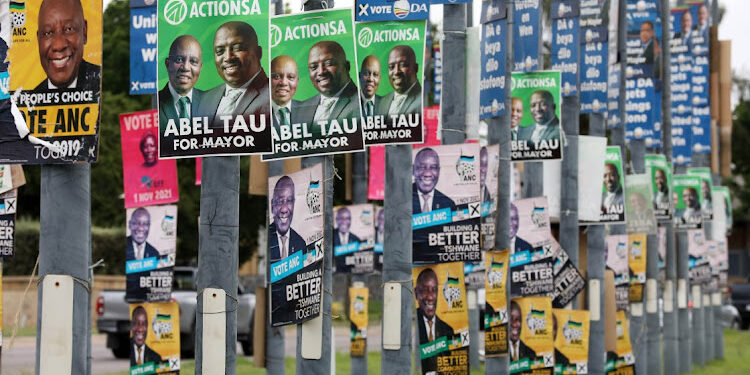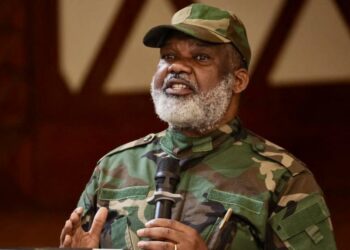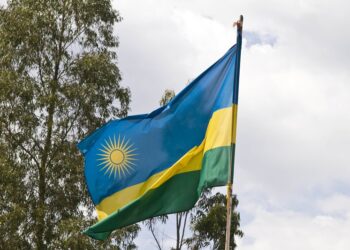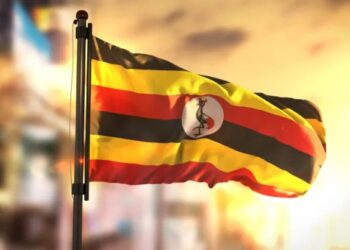On May 29, nearly 28 million South African registered voters will have the chance to elect representatives to the national and provincial parliaments. This will be the country’s seventh democratic general election. Since the apartheid era, the African National Congress (ANC) has continuously achieved a majority in both chambers of the South African Parliament. On the other hand, polls indicate that 2024’s general election could see the ANC get below 50 percent of the vote for the first time since 1994, bringing about a multi-party government for the first time, and that will be a significant inflection point for all.
Before the year 1994, one of the most highly polarized countries in the world was South Africa, due to the fact that white conquest and colonialism had strengthened the domination of a white minority and continuously reproduced poverty and powerlessness among a black majority for centuries. In April 1994, the first democratic election was won by the African National Congress (ANC), with Nelson Mandela becoming the first democratically elected president of the republic. Although the ANC had gained a majority vote (62%), the party formed the Government of National Unity, in which FD De Klerk and the ANC’s Thabo Mbeki became deputy presidents.
However, these problems persist despite the post-1994 political dominance of the ANC leadership as the representative of the overwhelming mass of the black, especially African, majority population. Some political pundits have revealed that the ANC might not secure enough votes to govern independently after the 2024 general election. Opposition parties have increased their capacity, experience, and leverage in forming coalitions, which has enabled them to steadily reduce the ANC’s parliamentary majorities over time—including in historic ANC strongholds.
Political analysts are of the opinion that the transition to democracy inaugurated an era of national reconciliation as political polarization receded. Conflict was largely replaced by peace, underpinned by growth rates not seen since the 1960s. Developments in infrastructure, services, and welfare provided substantial social progress and raised living standards for many in the black community. But today, this has facilitated the rise of a party-state elite bent on rapid accumulation, high levels of corruption, and a drift toward authoritarianism, they argued.
A Fragmented Political Landscape
More than 27.79 million voters—the highest since the dawn of democracy in South Africa—are eligible to cast their votes in the 2024 national and provincial elections, according to the Independent Electoral Commission (IEC). As of April 2024, a majority of 6.81 million registered voters for the South African general elections were between the ages of 30 and 39, which accounted for almost 25 percent of the total. Those in the 40- to 49-year-old age group followed, with approximately six million registered voters. Some 350 parties have registered for the 2024 elections, and for the first time, South Africa is also allowing independent candidates.
Obviously, in every poll since 1994, the African National Congress (ANC) has dominated the vote, earning it an absolute parliamentary majority from which it could independently select the president and initiate legislation. That may change during this electoral cycle. Analysts predict that even if it gains less than a majority of votes, the ANC still retains more support than any other political party in South Africa.
In the meantime, the leading opposition party is the Democratic Alliance (DA), led by John Steenhuisen, which polls show draws between a quarter and a third of the electorate largely on a good governance and anti-corruption platform. It must, however, overcome the perception of being a white-dominated party. The DA has entered into an alliance called the Multi-Party Charter for South Africa with six mostly small parties. Earlier in the month of March 2024, DA requested help from the U.S. in order to help monitor upcoming elections. However, South Africa’s president slammed the appeal, and the governing party says the request is misguided given issues with “the West’s” own polls. The observer added that South Africa is well-regarded as having held free and fair polls in the past, but the DA’s letter asks for foreign help to “safeguard the integrity” of what it notes will be “the most crucial election” in 30 years of democracy.
Still, the ANC also faces a challenge from the Economic Freedom Fighters (EFF) party led by the firebrand former ANC Youth League leader Julius Malema. The EFF has called for populist policies such as state-provided housing, nationalization of mines and other strategic sectors of the economy, and land redistribution. The party favors some radical far-left policies and is not part of the opposition coalition. If the EFF joined the coalition, that could push the ANC out of government, but the EFF and DA are far apart and as critical of each other as they are of the ANC. Similarly, polls indicate that EFF attracts roughly 10 percent of the electorate. An analyst says the EFF, which has campaigned on sweeping state nationalization and the expropriation of land without compensation, has cited control of the national treasury as a condition of backing the ANC.
While the former President of South Africa, Jacob Zuma, and the ex-leader of the ANC surprised his former party with the formation of a new party named uMkhonto we Sizwe (Spear of the Nation), After a long legal battle, Zuma was cleared to contest the upcoming election by the country’s electoral court in April 2024. In 2021, Zuma was sentenced to 15 months of imprisonment for defying a court order to appear before a judicial commission. Though observers say Zuma has made no secret of his bitterness against his successor, Ramaphosa, whose allies helped oust him in 2018, despite having his outstanding sentence commuted by the president in August, This has led some to speculate that Zuma would seek the removal of Ramaphosa as a condition for signing up for any coalition. In spite of failing to secure a single seat in the 2019 elections, former SABC chief operations officer (COO) Hlaudi Motsoeneng is not deterred. He hopes his party, the African Content Movement (ACM), will do well in the upcoming 2024 elections.
Economic inequalities and social disorders
Most recently, a non-profit company dedicated to fostering change through building social cohesion in online communities, the Centre for Analytics and Behavioural Change (CABC), said that the discussions on social media, with over 450,000 mentions between February 12th and 29th, revealed a mix of frustrations and hopes in regards to the forthcoming election. The University of Cape Town Graduate School of Business-based organization has indicated that the analysis of conversations on the 2024 elections highlights a troubling trend: the disengagement of young people, while senior citizens show continued support of the African National Congress (ANC). As many in the country of 62 million people faces deep socio-economic problems.
Experts say the impact of power instability is widespread, including limited hospital services, increasing food and water scarcity, rising bankruptcies, worsening crime rates, and unemployment exceeding 30 percent. South Africa’s central bank warns that load-shedding is poised to cost the economy nearly $13 billion this year. As the most industrialized economy on the continent, South Africa’s power woes are dragging down growth among its neighbors. Analysts say that prolonged blackouts will also threaten serious social and political unrest ahead of the upcoming national elections in 2024. However, reports from the media in 2023 show that political contract killings are escalating in South Africa, especially in the volatile province of KwaZulu-Natal, where trained assassins have been making their presence felt in the taxi industry, across the political spectrum, over tenders and jobs in municipalities, and in other areas such as business, to settle disputes through the barrel of a gun.
Technology and social media dynamics
In 1994, 86% of registered voters turned out; in 2019, it slumped to 49%. An analyst says that as South Africa goes to the polls, online campaigning is expected to play an unprecedented role in the high-stakes contest. While the online space can inform about parties’ policies and manifestos, the risk of disinformation—intentional distortion of information—is considerable. About 26 million people use social media in South Africa, and the number is rising. Whereas the rising number of eligible voters and the stable voter registration rate are concerning, election figures show a 47.2% increase in voter registration since the first official voters’ roll was created in 1999. Nevertheless, posts expressing variations of this sentiment have gained significant traction online. Alongside the criticism of the ANC, there is also a desire for information about alternative parties. Also, the YohVote app matches users with suitable parties and is gaining popularity, according to the CABC.
Recently, the Electoral Court cleared former president Jacob Zuma, the face of the uMkhonto Wesizwe (MK) party’s campaign, to stand for public office in the upcoming elections. He was also involved in a car accident while traveling in KwaZulu-Natal, and the incident was the topic of many discussions online. In addition, the CABC report also highlighted allegations of foreign interference from a TikTok video (reaching nearly 100,000 views across two posts) that discusses the history of U.S. involvement in coups throughout the developing world. Although experts advised that in order to counter such tactics, voters must be able to identify malign actors or accounts and recognize coordinated electoral disinformation campaigns, this empowers individuals to critically assess online information, enabling them to make informed decisions based on accurate and reliable sources rather than being swayed by deceptive narratives.
South Africa’s relationships with the West
Accordingly, South Africa views its relationships with Western countries as important, but they are mainly economic in nature. It has deeper political partnerships with other African countries, the BRICS, and countries in the Global South. And, while South Africa defines itself as nonaligned, its foreign policy reveals a deeper complexity that reflects a multialignment stance. The traditional anti-communist Republic of South Africa was seen as an ally of the Western Powers in their fight against the Soviet Union and its satellites.
Analysts note that South Africa’s ruling party, the ANC, has historical ties to Moscow that date back to the Cold War, when the Soviet Union supported its anti-apartheid struggle. These ties underpin the ANC’s good relations with Russia to this day. Pretoria remembers that during the Cold War, Washington not only designated the ANC as a terrorist organization but also refused to impose sanctions against the apartheid government until 1986—much later than many other important states. Beyond the focus on the BRICS, other attempts at regional diplomacy have been mixed. The Kremlin launched a Russia-Africa Summit in 2019, convening the summit again in 2023, even as it also clashed with the Economic Community of West African States (ECOWAS) over the bloc’s intervention in Niger’s July 2023 military coup.
South Africa’s Path to Progress
Analysts say that whatever the short-term consequences of the ANC losing its monopoly on power—and, economically, they could be pretty dire—something fundamentally good has happened: South African politics have become competitive. Consequently, to win votes in the future, experts have indicated that South Africa’s elections represent an assessment of how the ANC is addressing the evolving social and economic hardships facing the country. They will also be a test of the country’s ability to use democratic processes to forge new domestic alliances to address these challenges and set the country on a path of reform. In addition, experts suggest that even in the unlikely scenario in which the ANC survives the elections and retains power, opposition parties are set to play a major role in key policy decisions after the elections. This includes foreign policy, which is now the exclusive domain of the ANC. No matter the outcome of the elections, South Africa will soon reexamine its national interests and place in the global community. After the election, the global community looked toward a better South Africa for greater Africa.
ــــــــــــــــــــــــــــــ
This article expresses the views and opinions of the author and does not necessarily reflect the views of Qiraat Africa and its editors.



























































